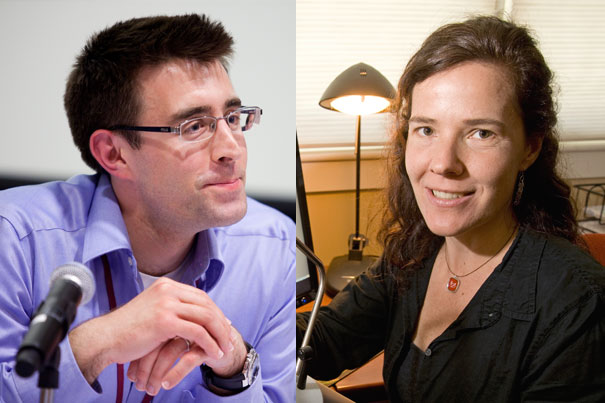
Arthur Spirling and Stacey Combes are this year’s winners of the Roslyn Abramson Award, given to assistant or associate professors for excellence in undergraduate teaching.
File photos by Stephanie Mitchell and Jon Chase/Harvard Staff Photographers
Abramson Award to Spirling, Combes
Social science, biology professors honored for excellence in undergraduate teaching
This year’s winners of the Roslyn Abramson Award are Arthur Spirling, the John L. Loeb Associate Professor of the Social Sciences in the Department of Government, and Stacey Combes, associate professor of organismic and evolutionary biology. The awards are given annually to assistant or associate professors for excellence in undergraduate teaching.
The $10,000 award, established with a gift from Edward Abramson ’57 in honor of his mother, goes each year to members of the Faculty of Arts and Sciences (FAS) “in recognition of his or her excellence and sensitivity in teaching undergraduates.” Recipients are chosen on the basis of their accessibility, their dedication to teaching, and their ability to communicate with and inspire undergraduates.
“Arthur Spirling and Stacey Combes are outstanding young scholars who are passionate about their fields and excel at engaging and inspiring their students. Their ability to guide undergraduates helps to ensure that Harvard continues to be an unmatched place of discovery for every student,” said FAS Dean Michael D. Smith, the John H. Finley Jr. Professor of Engineering and Applied Sciences. “On behalf of the College and the entire FAS, I offer them my thanks and congratulations.”
Stacey Combes
Combes, whose research focuses on biomechanics and behavioral ecology of insects, began teaching at Harvard in 2008. She said receiving the award was “unexpected.”
“It is really exciting. I am constantly trying to improve my teaching, and it seems to have paid off,” she said. “And not just receiving this award, but generally the response from my students has been very positive.”
Juggling teaching duties with research in the field and the lab can be difficult, but Combes said that is why she and her colleagues have chosen this profession.
“It certainly can be a balancing game. But the teaching is so important because it is a meaningful aspect of our job,” Comes said. “One of the great things about Harvard is the classes are so small it makes it much easier to engage with the students. It allows me to interact with them more as a peer and enables me to erase some of the distance that may exist in larger classrooms.”
Combes said sharing her research with undergraduates and helping them understand the material, which can be complex, is very gratifying.
“I try to make the atmosphere engaging. I, of course, am always excited about the material, which I think is key to getting the students to better understand the material,” she said.
Arthur Spirling
Spirling doesn’t see much separation between his teaching and research.
“My view is it’s hard to be good at research unless you’re teaching. That’s because teaching keeps you sharp; it forces you to review the basic material and reinforce the fundamental concepts in your mind,” he said. “It’s easy when you’re not teaching to lose sight of those things. Because of that, I don’t know that teaching and research are separate endeavors.”
Spirling specializes in political methodology and legislative behavior, and part of his teaching includes quantitative methods, which can cause some trepidation in some undergraduates.
“I always have this nervousness that the students won’t enjoy it,” he said. “And sometimes the material may be quite dry, but I find a judicious amount of humor goes a long way. Also, try to do live demonstrations in class when possible and assign homework that is relative to them.”
With the $10,000 prize, Spirling said he will launch a new research project and likely hire undergraduates to assist. He said being recognized with the Abramson award was “quite humbling.”
“I had two main emotions. One was absolute delight, and the other was complete shock. With my teaching fellows, we put a lot of work into the class, so it is truly wonderful to be recognized for the work,” Spirling said.




